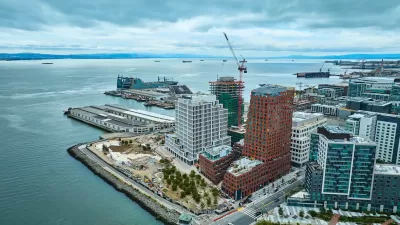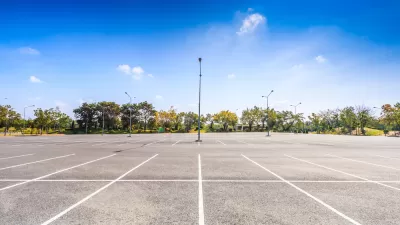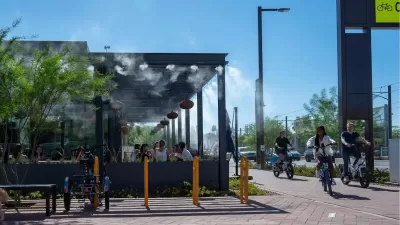Washington D.C. has begun to make key green parking reforms that will plow parking revenue into neighborhood bicycling and walking improvements.
"In a first for a big east coast city, Washington, DC, is putting the ideas of celebrated parking reformer Professor Donald Shoup to work. Spurred by concerns over game day traffic surges caused by the opening of a new baseball stadium, the city council recently created two performance parking pilot project zones. The most important provision of the legislation is that 75 percent of the meter revenue, after initial expenses and maintenance, "Shall be used solely for the purpose of non-automobile transportation improvements in that pilot zone." This includes a menu of transit, bicycling and pedestrian improvements including sidewalk widenings, traffic calming, separated bikeways and real-time information signs for buses and trains."
"The project is especially exciting, because once parking money from the pilot zones begins to translate into actual neighborhood improvements, DC voters will want more parking reform and parking revenue return in their neighborhoods."
"The force behind the legislation was Council Member Tommy Wells, whose campaign slogan, "For a Livable and Walkable Community," is prominently featured on his web site. Wells says he held "over a dozen community meetings and town halls" to build a consensus around the plan. His work seems to have paid off. The new zones and especially the revenue return provision have been cheered by the press and local livable streets advocates, including those at Greater Greater Washington.org."
Thanks to John Kaehny
FULL STORY: DC to Devote Parking Fees to Livable Streets

Alabama: Trump Terminates Settlements for Black Communities Harmed By Raw Sewage
Trump deemed the landmark civil rights agreement “illegal DEI and environmental justice policy.”

Planetizen Federal Action Tracker
A weekly monitor of how Trump’s orders and actions are impacting planners and planning in America.

How Atlanta Built 7,000 Housing Units in 3 Years
The city’s comprehensive, neighborhood-focused housing strategy focuses on identifying properties and land that can be repurposed for housing and encouraging development in underserved neighborhoods.

In Both Crashes and Crime, Public Transportation is Far Safer than Driving
Contrary to popular assumptions, public transportation has far lower crash and crime rates than automobile travel. For safer communities, improve and encourage transit travel.

Report: Zoning Reforms Should Complement Nashville’s Ambitious Transit Plan
Without reform, restrictive zoning codes will limit the impact of the city’s planned transit expansion and could exclude some of the residents who depend on transit the most.

Judge Orders Release of Frozen IRA, IIJA Funding
The decision is a victory for environmental groups who charged that freezing funds for critical infrastructure and disaster response programs caused “real and irreparable harm” to communities.
Urban Design for Planners 1: Software Tools
This six-course series explores essential urban design concepts using open source software and equips planners with the tools they need to participate fully in the urban design process.
Planning for Universal Design
Learn the tools for implementing Universal Design in planning regulations.
Jessamine County Fiscal Court
Caltrans
Institute for Housing and Urban Development Studies (IHS)
City of Grandview
Harvard GSD Executive Education
Toledo-Lucas County Plan Commissions
Salt Lake City
NYU Wagner Graduate School of Public Service





























